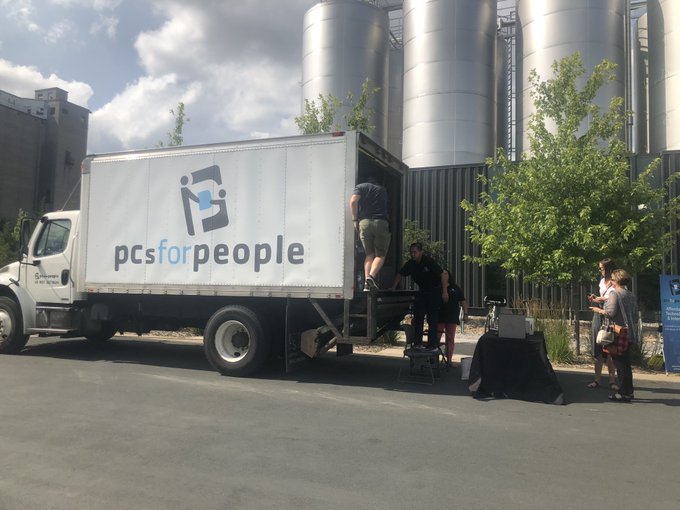An organization working to increase digital access by refurbishing computers recycled by businesses is expanding to Baltimore.
PCs for People, which was founded in St. Paul, Minnesota, provides technology, internet access and tech training to people who are below the 200% poverty level, or are enrolled in a government assistance program.
The local expansion, which is supported by a grant from the Robert W. Deutsch Foundation, is expecting to launch in Baltimore in 2020, said Kelly Hodge-Williams, who is leading the effort as the site director of PCs for People in Baltimore. It will be the fourth city for the 20-year-old organization, which also works in Denver and Cleveland.
The desktop and laptops provided to staff at many businesses are frequently refreshed, and many are switched out while there’s still usable life remaining. The organization offers a recycling service so they don’t go to waste. PCs for People picks up the devices that are being replaced, wipes the data and refurbishes the computers for new use. Then, they’re sold at a low cost to residents.
In providing a new home for the computers, the organization is also an outlet for recycling e-waste. Stats indicate that just 20% of e-waste is recycled. When burned, the metals created by devices can also release chemicals into the air or water that can harm the environment and impact climate change.
“As PCs for People expands to more cities across the country, we think we can get much more out of landfills and to low-income people,” Hodge-Williams said.
Even as the technology community grows, a large group of Baltimore residents remain without access. Putting a focus on the need for digital equity initiatives, a Deutsch Foundation report released in 2017 stated that more than 74,000 households in Baltimore City lack internet access — which can impact those who need to do homework, apply for jobs and register to vote.
Nationwide, “70 percent of the people that come to [PCs for People] have never owned a computer before,” Hodge said.
Providing the computers is one of three ways the organization looks to increase digital access. Many of the households that are using a computer in cities where the organization is currently operating also subscribe to a lower-cost internet service that’s offered by the organization.
Additionally, PCs for People provides tech training so residents are equipped with basic skills to navigate the computers for their uses.
The organization will look to set up a physical space in order to provide both the repair work and digital literacy training, and to hire a local team, Hodge-Williams said.
Hodge-Williams is seeking to connect with businesses that would be interested in recycling e-waste, as well as other organizations working on tech access. She can be reached at khodgew@pcsforpeople.com.
Before you go...
Please consider supporting Technical.ly to keep our independent journalism strong. Unlike most business-focused media outlets, we don’t have a paywall. Instead, we count on your personal and organizational support.
3 ways to support our work:- Contribute to the Journalism Fund. Charitable giving ensures our information remains free and accessible for residents to discover workforce programs and entrepreneurship pathways. This includes philanthropic grants and individual tax-deductible donations from readers like you.
- Use our Preferred Partners. Our directory of vetted providers offers high-quality recommendations for services our readers need, and each referral supports our journalism.
- Use our services. If you need entrepreneurs and tech leaders to buy your services, are seeking technologists to hire or want more professionals to know about your ecosystem, Technical.ly has the biggest and most engaged audience in the mid-Atlantic. We help companies tell their stories and answer big questions to meet and serve our community.
Join our growing Slack community
Join 5,000 tech professionals and entrepreneurs in our community Slack today!

The person charged in the UnitedHealthcare CEO shooting had a ton of tech connections

From rejection to innovation: How I built a tool to beat AI hiring algorithms at their own game

Where are the country’s most vibrant tech and startup communities?



